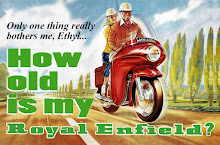 |
| Could a Royal Enfield motorcycle look more dashing than this 1934 Bullet? |
It's a "sloper" (with its cylinder canted forward to enhance the look of speed). The big finned oil tank ahead of the cylinder looks incredibly racy. The dual exhausts (on a single cylinder) are extra showy.
Also rare, in Royal Enfield history, is its four-valve head, a production feature only in the 1930s. The valve gear is exposed.
Frank received this dating information from Graham Scarth, chairman of the Royal Enfield Owners Club UK (the club has the factory ledgers):
"The bike is a 1934 Model LFL (meaning an LF with lights) four-valve, 488cc machine that was dispatched from Redditch on the 13th December, 1933 destined for Real of Tenerife." Tenerife is the largest of the Canary Islands.
 |
| Is headlight that big or is the motorcycle that small? |
He attached a 1934 catalog illustration showing what the motorcycle would have looked like new.
Today this Royal Enfield displays eight decades of well earned patina. While "fully complete," it doesn't start, Frank wrote.
 |
| 1934 Royal Enfield Model LF carried the "500 Bullet" name. |
"Then it broke one of the tappets and the bike was sold to a German doctor who begins to rebuild the bike. With the help of a lathe shop they finished a new tappet, mounted new tires, and replaced the primary and secondary drive.
"The new tappet was not installed, so the bike didn't start. Then the doctor lost interest and forgot the bike for 10 years in a garage with a lot of other bikes.
 |
| Brass carburetor. Note the exposed valves to right. |
"At the moment, I don't know how I will proceed. Is it better to leave all in this state (original) or is it better to paint and rebuild it? I don't know.
"Maybe I will sell it to people who have better possibilities to restore it perfectly."
 |
| Sloper motor and finned crankcase attract the eye. |
The dashing "sloper" motors were replaced by upright cylinders in 1936 and Royal Enfield returned to two-valve heads as standard for 1938.
 |
| ...but those twin exhausts must have sold some bikes, too. |






















I have an early 1931 model. JFL.
ReplyDeleteAny information on it would be appreciated.
Richerd.
Peter Miller's book "Royal Enfield The Early History" says that "A last minute surprise at the Olympia Motorcycle Show in November 1930 was the new Model JF, which boasted a four-valve version of the 488cc overhead valve engine fitted into the new duplex frame. It was priced at 50 pounds with a three-speed gearbox or 52 with a four-speed box." The book contains simple line drawings of the duplex cradle frame and the cylinder head of the new 488cc four-valve Model JF. I have written a blog item, with a magazine drawing of the Model JFL, at this link.
Delete